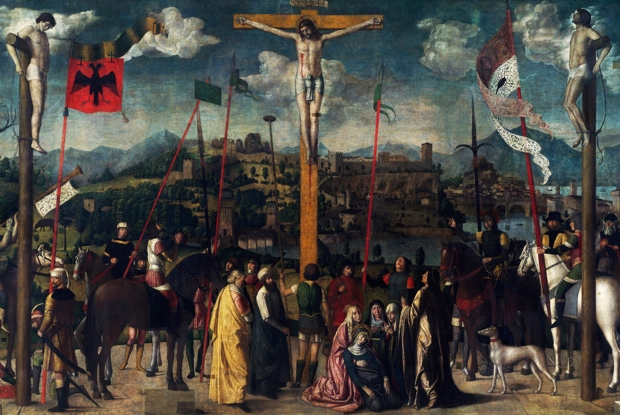Given the decline of Christian belief in the UK, it’s surprising to discover there’s quite so much about the Easter story on the airwaves this week. You might have assumed that no space would have been found in the schedules for a retelling of the central but yet most difficult Christian narrative. Christmas is easy to sell and to dwell on, with its baby, its joyous arrival, its exotic gifts, but Easter? Who hasn’t as a child in a Christian household bewailed the gloom and doom of Good Friday? Who hasn’t at some point given up on attempting to understand the great paradox of the Passion as it takes us from the triumphant glory of Palm Sunday when Jesus entered Jerusalem to the horrific events of Good Friday fewer than seven days later?
Yet on the evening of Good Friday, Radio 2 gave us an hour-long meditation uncompromisingly entitled At the Foot of the Cross. No avoiding, then, the implications of that story — the bloodied hands and feet, the rejection, the pain, the utter despair, and the apocalyptic rupture of the Temple curtain at the hour of three, when the skies darkened and the last words of Christ echoed through Calvary. On 4, there was not only a Good Friday meditation by the Archbishop of York but also The Archers put Chris on the Cross, quite literally, as the Ambridge villagers acted out the Passion with Neil Carter’s blacksmith son taking on the central, sacrificial role. (‘The hunky young farrier with his chest out,’ as Kirsty so memorably foretold a week earlier.)
Radio 3, meanwhile, devoted The Essay all week to five meditations on Christian themes by the journalist Madeleine Bunting. She took as her inspiration the ‘Retreating Roar’ of Matthew Arnold’s poem ‘Dover Beach’, comparing society’s gradual loss of faith to the ebbing of the tide across a pebbled beach. He of course was talking about the mid-Victorians with their imperial ambitions and consumer greed. But we have seen a much more drastic retreat of religious faith in the 21st century with an accompanying loss of ritual and meaning, even a loss in how time is measured out, so that Sunday blurs into any other day of the week and Whitsun, Ascension, Advent have all but disappeared from the calendar.
Bunting, who was brought up as a devout Catholic but now declares herself not to be a practising Christian, wondered what the implications of these losses might be to concepts like Glory, Sin, Salvation, Patience, Sacrifice. We might have freed ourselves from centuries of angst about sin and fear of the Last Judgment but at what price?
It was stirring, thought-provoking stuff. Not exactly an easy or comforting listen, but well worth paying attention to as we dive into the chocolate bunnies and gorge ourselves on spring lamb. The urge to glorify, to be uplifted by worship, Bunting argues, has not been lost along with our loss of faith. We may no longer sing praises each week to an almighty God whose ‘saving presence animates the entire universe’ but instead we are in thrall to glamour, to celebrity, poring over the pages of magazines like Glamour and idolising its honey-toned beauties in their skin-tight jeans.
Her substitution of contemporary glamour for ancient glory was intriguing. As was her suggestion that the sense of worthlessness, even to the extent of self-revulsion, that was for centuries created by the Christian Church’s emphasis on the seven deadly sins has not in any way been expunged by the rejection of sin, hell and damnation. On the contrary, Bunting says, instead of the Church manipulating and exploiting us by instilling in us the fear of sinning, it’s consumer capitalism that has done for us, telling us we’re too fat, too lazy, too poor, too lowly. Instead of purging ourselves of sin we are far more likely to castigate ourselves for not going to the gym or for eating an extra slice of cake — but ‘without any recourse to a meaningful redemption’, to the promise of salvation through the re-enactment of the Passion story. In other words, our sense of guilt is far worse.
By now you are probably experiencing that familiar sense of Good Friday gloom. Bunting also came up with some redemptive ideas, as she extolled the virtues of patience (a gift to those of us who dislike so intensely the urgency of digital technology). ‘Patience,’ she argues, ‘is the essential ingredient and the most counter-cultural idea of Christianity.’ It’s patience we need, says Bunting, not speed, if we want truly to learn anything. It’s also crucial to us as individuals and as a society. Without an understanding of patience, of the value of waiting rather than focusing on one’s own self-definition and self-fulfilment, we cannot begin to deal with the increasing problem of old age. Waiting, or life in the slow lane (not speed, multitasking, being a conscientious consumer, seeking the best deal, the cheapest tariff), is not just a virtue, it’s also an essential life skill, a survival strategy. Hurrah.






Comments